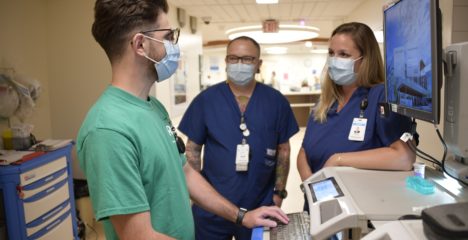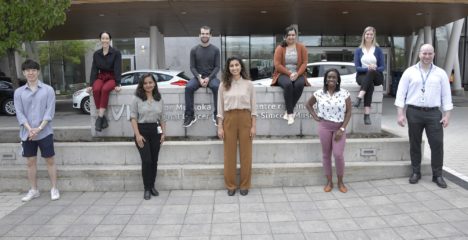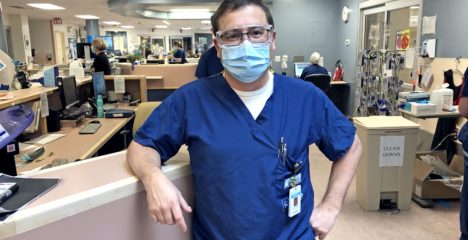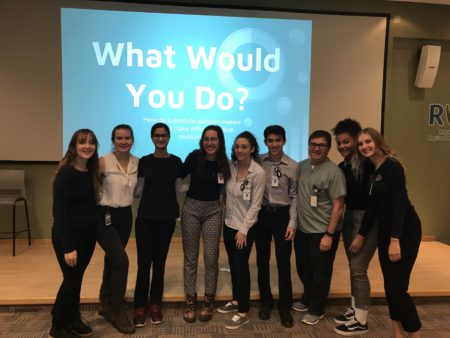Our Teaching & Research
Accelerate Teaching & Research
We will advance learning and seek out new research opportunities that support organizational performance and enhance patient care.
RVH Continues its Legacy of Teaching
Previous Stories from 2021-2022 Annual Report

Throughout the pandemic, RVH continued to focus on delivering high-quality patient care by hiring more than 350 additional staff, including internationally trained nurses and 72 clinical externs.
In order to create capacity and relief from staffing shortages, the Ministry of Health created the Enhanced Extern Program. Clinical externs are students in various stages of schooling in the fields of nursing, respiratory therapy, medicine or paramedic programs. They work with members of the interprofessional team under supervision of registered healthcare providers. Their duties include helping patients with care needs, preparing them for procedures or tests, taking vital signs and medical charting.
“The impacts of COVID have been felt across the board and students have been affected by having clinical rotations cancelled,” says Simone Abusow, RPN, is one of the clinical extern supervisors. “This program provides students an opportunity to obtain hands on experience in a hospital setting. They are able to walk onto the units with confidence knowing that they are familiar with the nursing staff, the patients, and the documentation system. They are able to offer support to their classmates and even to some of their instructors which, in turn, reflects positively on RVH and the benefits this program offers to students.”
Externs are not assigned to one unit specifically so they get a well-rounded opportunity to learn and see new things they may not otherwise had the opportunity to and upon completion of their program, they have a better idea of the type of nursing they want to pursue.
Extern Joseph Guarrasi is entering his third year of the Bachelor of Nursing program at York University. “In school we learn a lot of theory, but the practical hands on component is vital to our learning. Caring for a patient in the clinical setting allows us to develop stronger therapeutic skills and strengthen our communication and confidence with patients, nurses, and the interprofessional team, he says. “My goal is to make each patient interaction the best possible and to help the nurses lighten their workload by offering assistance. I leave my shift knowing I made a little bit of a difference in someone’s life.”
One of RVH’s strategic directions is to accelerate teaching and education. RVH and its neighbour, Georgian College have a long-standing partnership to provide both RN’s and RPN’s with hands-on training and, in fact, recently RVH provided onsite training for 88 RN’s and 61 RPN’s. They work alongside RVH staff and physicians gaining valuable on-the-job experience as part of their education requirements.
Programs like these are invaluable, providing training for the next generation of healthcare providers and ensuring the patients entrusted to RVH’s care get the attention and medical care they need.

RVH is training some of the best future family physicians in Canada, many of whom choose to stay in the region.
Through RVH’s Family Medicine Teaching Unit (FMTU), a partnership with the University of Toronto Department of Family and Community Medicine, family medicine residents complete their final two years of training at RVH.
“These residents have the opportunity to practice medicine with a full caseload of patients while gaining invaluable knowledge as they work alongside RVH’s many skilled physicians,” says Dr. Stu Murdoch, Director, Postgraduate Education, Department of Family & Community Medicine, University of Toronto and Academic Chief, Department of Family Medicine, RVH. “It is an extraordinary environment in which to learn to become well-rounded and well-trained family physicians.”
Since the program began in 2009, 92 family medicine residents have trained at RVH, with 55 staying in the area to set up their own practices, provide temporary coverage for area physicians or work in the health centre’s Emergency, Hospitalist, and Palliative Care departments.
“The Family Medicine Teaching Unit has exceeded all my expectations since I moved here from Vancouver in 2020. I am lucky to have outstanding teachers who are supportive and passionate about medical education. I believe RVH is helping to train some of the best future family physicians in Canada,” says Dr. Alis Xu.
Transitioning from medical school to residency can be daunting, but Dr. Taylor Stanojev, who started her residency at the FMTU in July 2021, says that journey was smooth thanks to the collegial and welcoming environment of the FMTU.
“The transition from medical school can be exciting, but also daunting. Thankfully, my supervisors and colleagues have been extremely supportive, and I felt whole-heartedly welcomed by the community. I have had the pleasure of meeting many wonderful patients during their healthcare journey at RVH and I look forward to additional learning experiences as I enter my second year of training,” says Dr. Stanojev.
The FMTU is privileged to have 27 family physicians who invest in the training of the next generation of physicians, including: Dr. Stu Murdoch, Academic Chief; Dr. Christine Stewart – Site Director; Dr. Anwar Parbtani and Dr. Matt Orava – Research Leads; Dr. Melissa Witty and Dr. Lynda Ekeh – Quality Improvement Leads; Dr. Jacky Lai – Undergraduate Lead; Dr. Jessie Weaver – Faculty Development Representative and Dr. Kerstin Mossman – Academic Half Day Lead.
“As a teaching hospital we merge education and healthcare excellence to have a significant, positive impact on our community,” says Janice Skot, RVH President and CEO. “Many physicians who have completed their training at RVH have gone on to establish practices in the area which has helped meet some of the demand for family physicians. As RVH continues to accelerate its teaching and research mandate, we will continue grow – and hopefully keep – exceptional physicians in this region.”

Dr. Giulio DiDiodato is now doing the kind of important research that only used to be done in large academic centres right in Barrie at Royal Victoria Regional Health Centre.

Research is being used to answer questions from how to develop the best cancer drug, to how to best communicate with patients at end of life. And research, says DiDiodato, is not always ‘putting on a lab coat and looking into a petri dish through a microscope.’ But it is always, finding the answer to a question.
“Everyday, when we care for patients, we ask ourselves questions about how we could do things better. The best way to answer those questions is through research,” says Dr. DiDiodato RVH’s Chief Research scientist.
RVH conducts at least 50 to 100 studies each year. For Dr. DiDiodato, there are three large research projects on the horizon that he is especially excited about.
“We will soon be starting the largest randomized controlled trial conducted to date at a Canadian community hospital with over 1,100 hospitalized RVH patients expected to be enrolled over a three-year study period. This study’s objective is to measure the impact that a consistent approach to goals of care discussions has on ensuring that elderly patients’ end-of-life care is aligned with their treatment preferences.
He is also collaborating with a not-for-profit, social services community partner on a research project to measure the impact that wraparound mental health and addictions services have on program completion and employment rates for the visible minorities and women enrolled in a vocational training program.
But the most ambitious study is a multi-centre, randomized control trial involving Simcoe Muskoka’s four Rapid Access to Addictions Medicine (RAAM) clinics. This study measures which of two treatment paths for opioid addiction is more effective in achieving adherence to treatment and eventual drug abstinence.
“These three randomized trials represent the gold standard for conducting research and demonstrate how far we have come. They elevate RVH as a centre of excellence for community hospital research,” say Dr. DiDiodato.
In fact, in May 2018 RVH made the commitment to research official with the opening of the Centre for Research (CER), with dedicated space and resources providing Research Ethics Board review, clinical trials support, student scholarships, research awards, investigator consultations, library services, and an annual applied health research conference.
“One of RVH’s strategic priorities is to accelerate teaching and research so the opening of CER was another milestone as we work to achieve this goal,” says Janice Skot, RVH president and CEO. “Our commitment is to advance learning and seek out research opportunities that support organizational performance and enhance patient care. Within the walls of the CER, and throughout the health centre, this important work is happening.”
With a passion for seeking answers through research, Dr. DiDiodato says he’s literally got his dream job.
“If someone had of told me I’d have the opportunity to do what I’m doing now in a community hospital I would never have believed them,” he says. “Our CEO, senior leadership, hospital board and Foundation are progressive and believe research is a vital strategic pillar, which makes us one of a handful of stand-alone community hospitals with such a focus. Even though we have an intense focus on teaching and research, they aren’t new to RVH. RVH has been using research for years, not just to improve care, but also to validate and explore best practices. And we’ve been sharing our expertise as teachers and mentors since the day we opened our doors almost 125 years ago, helping to shape the next generation of healthcare providers.”